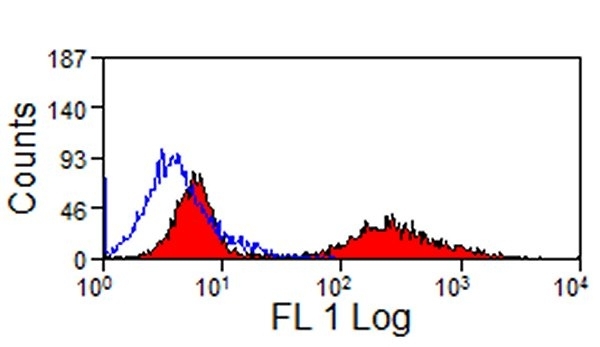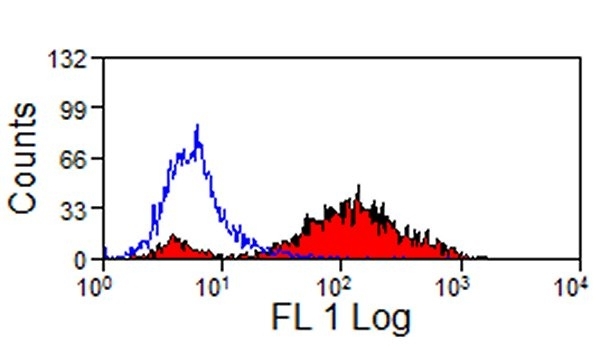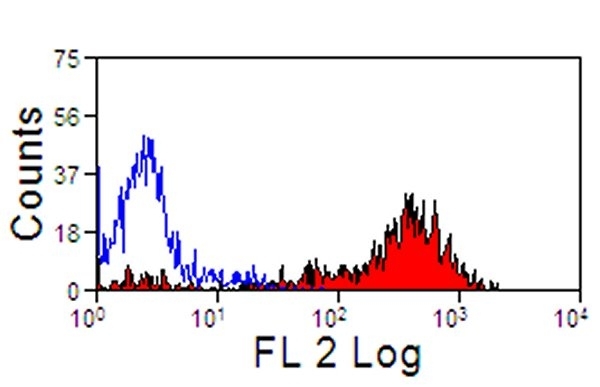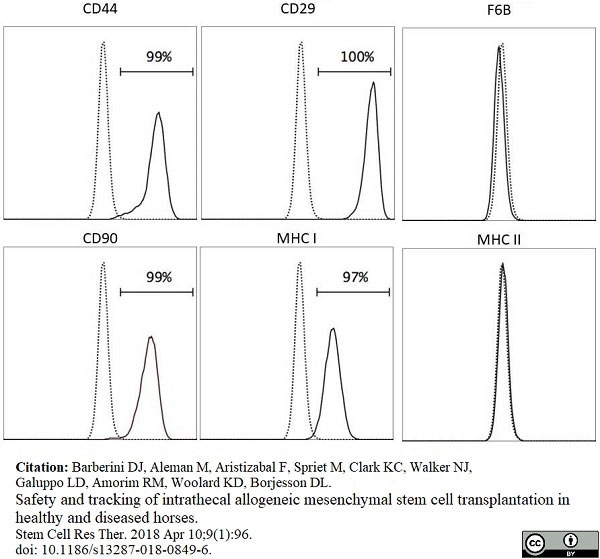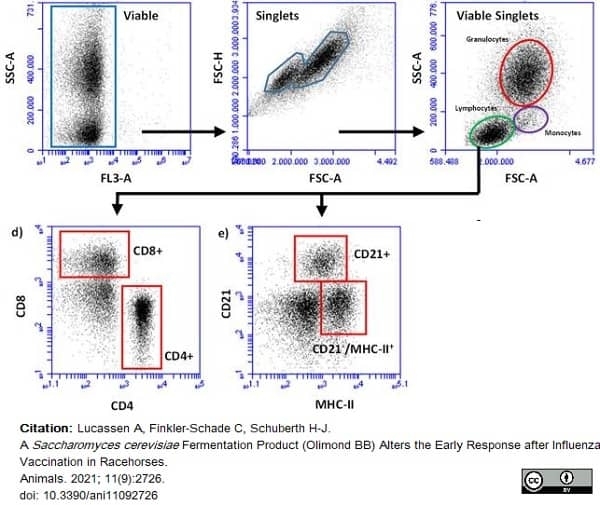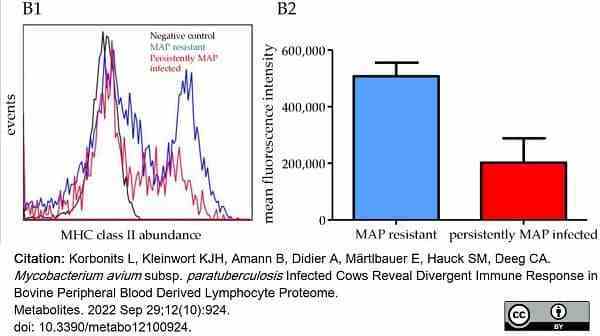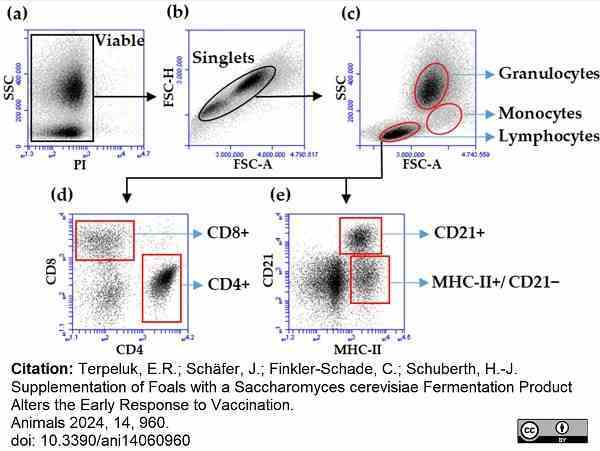MHC Class II Monomorphic antibody | CVS20







Mouse anti Horse MHC Class II Monomorphic
- Product Type
- Monoclonal Antibody
- Clone
- CVS20
- Isotype
- IgG1
- Specificity
- MHC Class II Monomorphic
| Mouse anti Horse MHC Class II Monomorphic antibody, clone CVS20 recognizes monomorphic equine MHC Class II and was classified at the International Equine Leucocyte Antigen Workshop. Clone CVS20 reacts with all equine B cells and 95% of equine T cells. The major histocompatibility complex (MHC) is a cluster of genes that are important in the immune response to infections. In horses, this is referred to as the equine leukocyte antigen (ELA) region. |
- Target Species
- Horse
- Species Cross-Reactivity
-
Target Species Cross Reactivity Human Bovine Dog - N.B. Antibody reactivity and working conditions may vary between species.
- Product Form
- Purified IgG - liquid
- Preparation
- Purified IgG prepared by affinity chromatography on Protein G from tissue culture supernatant
- Buffer Solution
- Phosphate buffered saline
- Preservative Stabilisers
- 0.09% sodium azide (NaN3)
- Carrier Free
- Yes
- Immunogen
- 3132 cells.
- Approx. Protein Concentrations
- IgG concentration 1.0 mg/ml
- Fusion Partners
- Spleen cells from immunised BALB/c mice were fused with cells of the X.63-Ag8.653 mouse myeloma cell line
- Regulatory
- For research purposes only
- Guarantee
- 12 months from date of despatch
Avoid repeated freezing and thawing as this may denature the antibody. Storage in frost-free freezers is not recommended.
| Application Name | Verified | Min Dilution | Max Dilution |
|---|---|---|---|
| Flow Cytometry | 1/25 | 1/200 | |
| Immunohistology - Frozen | |||
| Immunoprecipitation |
- Flow Cytometry
- Use 10μl of the suggested working dilution to label 106 cells in 100μl
References for MHC Class II Monomorphic antibody
-
Lunn, D.P. et al. (1998) Report of the Second Equine Leucocyte Antigen Workshop, Squaw valley, California, July 1995.
Vet Immunol Immunopathol. 62 (2): 101-43. -
Weiss, D.J. et al. (2001) Regulation of expression of major histocompatibility antigens by bovine macrophages infected with Mycobacterium avium subsp. paratuberculosis or Mycobacterium avium subsp. avium.
Infect Immun. 69 (2): 1002-8. -
Out, T.A. et al. (2002) Local T-cell activation after segmental allergen challenge in the lungs of allergic dogs.
Immunology. 105 (4): 499-508. -
Catchpole, B. et al. (2002) Generation of blood-derived dendritic cells in dogs with oral malignant melanoma.
J Comp Pathol. 126: 238-41. -
Weiss, D.J. et al. (2006) Mucosal immune response in cattle with subclinical Johne's disease.
Vet Pathol. 43: 127-35. -
Sassa, Y. et al. (2010) Bovine macrophage degradation of scrapie and BSE PrPSc
Vet Immunol Immunopathol. 133: 33-9. -
Carrade, D.D. et al. (2011) Clinicopathologic findings following intra-articular injection of autologous and allogeneic placentally derived equine mesenchymal stem cells in horses.
Cytotherapy. 13: 419-30. -
Weiss, D.J. (2001) Evaluation of proliferative disorders in canine bone marrow by use of flow cytometric scatter plots and monoclonal antibodies.
Vet Pathol. 38: 512-8.
View The Latest Product References
-
Carrade, D.D. et al. (2012) Comparative Analysis of the Immunomodulatory Properties of Equine Adult-Derived Mesenchymal Stem Cells().
Cell Med. 4 (1): 1-11. -
Hussein, H. et al. (2016) Cathepsin K inhibition renders equine bone marrow nucleated cells hypo-responsive to LPS and unmethylated CpG stimulation in vitro.
Comp Immunol Microbiol Infect Dis. 45: 40-7. -
Hussein, H. et al. (2016) Cathepsin K inhibition renders equine bone marrow nucleated cells hypo-responsive to LPS and unmethylated CpG stimulation in vitro.
Comp Immunol Microbiol Infect Dis. 45: 40-7. -
de Moraes, C.N. et al. (2016) Bovine endometrial cells: a source of mesenchymal stem/progenitor cells.
Cell Biol Int. 40 (12): 1332-1339. -
Maumus, M. et al. (2016) Utility of a Mouse Model of Osteoarthritis to Demonstrate Cartilage Protection by IFNγ-Primed Equine Mesenchymal Stem Cells.
Front Immunol. 7: 392. -
Ziegler, A. et al. (2016) Identification and characterization of equine blood plasmacytoid dendritic cells.
Dev Comp Immunol. 65: 352-7. -
Maia, L. et al. (2017) A proteomic study of mesenchymal stem cells from equine umbilical cord.
Theriogenology. 100: 8-15. -
Maia, L. et al. (2017) Conditioned medium: a new alternative for cryopreservation of equine umbilical cord mesenchymal stem cells.
Cell Biol Int. 41 (3): 239-48. -
Abdelhamid, L. et al. (2017) Retinoic acid-mediated anti-inflammatory responses in equine immune cells stimulated by LPS and allogeneic mesenchymal stem cells.
Res Vet Sci. 114: 225-32. -
Barberini, D.J. et al. (2018) Safety and tracking of intrathecal allogeneic mesenchymal stem cell transplantation in healthy and diseased horses.
Stem Cell Res Ther. 9 (1): 96. -
Dos Santos, V.H. et al. (2019) Evaluation of alginate hydrogel encapsulated mesenchymal stem cell migration in horses.
Res Vet Sci. 124: 38-45. -
Witonsky, S. et al. (2019) Can levamisole upregulate the equine cell-mediated macrophage (M1) dendritic cell (DC1) T-helper 1 (CD4 Th1) T-cytotoxic (CD8) immune response in vitro.?
J Vet Intern Med. 33 (2): 889-96. -
Lopez, B.S. et al. (2019) The effect of age on foal monocyte-derived dendritic cell (MoDC) maturation and function after exposure to killed bacteria.
Vet Immunol Immunopathol. 210: 38-45. -
Lucassen, A. et al. (2021) A Saccharomyces cerevisiae Fermentation Product (Olimond BB) Alters the Early Response after Influenza Vaccination in Racehorses.
Animals (Basel). 18;11(9):2726. -
Korbonits, L. et al. (2022) Mycobacterium avium subsp. paratuberculosis Infected Cows Reveal Divergent Immune Response in Bovine Peripheral Blood Derived Lymphocyte Proteome.
Metabolites. 12 (10): 924.. -
Lopez, B.S. et al. (2020) Phenotypic characterization of equine monocyte-derived dendritic cells generated ex vivo utilizing commercially available serum-free medium.
Vet Immunol Immunopathol. 222: 110036. -
Lopez, B.S. et al. (2020) The effect of foal or adult horse plasma on equine monocyte-derived dendritic cell phenotype and function.
Vet Immunol Immunopathol. 228: 110099. -
Lopez,.B.S. et al. (2024) The effect of cortisol on equine monocyte–derived dendritic cell phenotype and cytokine production
Vet Med Sci. 10 (2): e1333 [Epub ahead of print]. -
Cabezas, J. et al. (2020) In vitro preconditioning of equine adipose mesenchymal stem cells with prostaglandin E(2), substance P and their combination changes the cellular protein secretomics and improves their immunomodulatory competence without compromising stemness.
Vet Immunol Immunopathol. 228: 110100. -
Terpeluk, R.E. et al. (2024) Supplementation of Foals with a Saccharomyces cerevisiae Fermentation Product Alters the Early Response to Vaccination
Animals. 14 (6): 960.
Further Reading
-
Burk, J. et al. (2013) Equine cellular therapy-from stall to bench to bedside?
Cytometry A. 83: 103-13
MCA1085GA
If you cannot find the batch/lot you are looking for please contact our technical support team for assistance.
Please Note: All Products are "FOR RESEARCH PURPOSES ONLY"
View all Anti-Horse ProductsAlways be the first to know.
When we launch new products and resources to help you achieve more in the lab.
Yes, sign me up